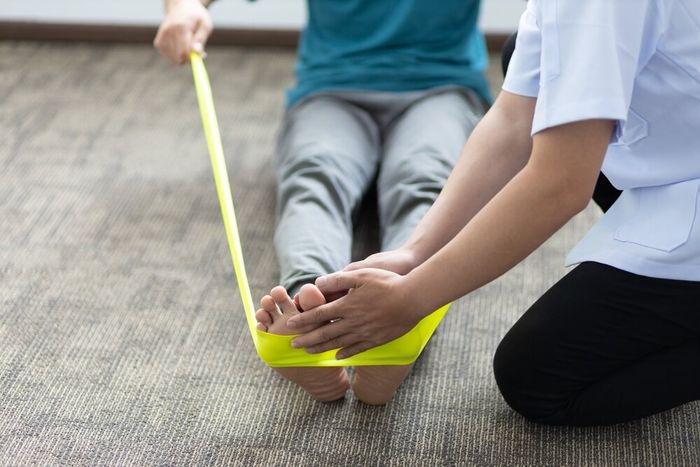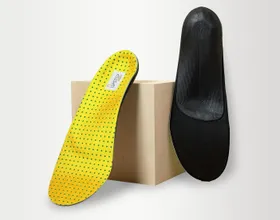Recommended Treatments for Reversible Peripheral Neuropathy
Published August 16, 2022.

Neuropathy is the altered sensation (numbness, burning, tingling) and pain caused by nerve damage or dysfunction. Neuropathy occurs frequently and is one of the common causes of burning heels.
An estimated 25% to 30% of Americans have neuropathic symptoms. Neuropathy typically affects the extremities (hands and feet) and is therefore a significant cause of foot pain. Neuropathy must be treated before it leads to permanent nerve damage.
Depending on the cause, it may also be reversible. Apart from its idiopathic cause, other possible causes of neuropathy include diabetes causing burning feet, direct trauma, medications, poisoning, inherited and autoimmune disorders, alcoholism, abnormal vitamin levels, and vascular problems.
Let’s consider some of the reversible causes of neuropathy in more detail and possible ways to treat them.
Causes of Neuropathy That Can Be Reversed
Current research evidence suggests that nerve damage is partly reversible. While this doesn't apply to all causes of nerve damage, some can be reversed before they cause permanent nerve damage. These causes include:
- Vitamin deficiency: Appropriate levels of vitamins E, B1, B3, B6, and B12 are necessary for healthy nerves. Neuropathy occurs when there is a deficiency. By increasing your vitamin uptake and meeting the recommended minimum levels, neuropathy reverses.
- Alcoholism: Chronic alcoholism depletes thiamine levels and other essential nutrients necessary for healthy nerve function. Reducing alcohol consumption before it causes permanent nerve damage can also cause neuropathy to reverse.
- Infection: Certain infections like chicken pox and shingles cause neuropathy. If the infection is brought under control quickly, reversing neuropathy becomes possible.
- Tumor: Where neuropathy is due to nerve compression by a tumor, removal of the tumor will relieve the neuropathy and cause a reversal.
How to Treat Reversible Peripheral Neuropathy
Home remedies for burning feet may help in minimizing the symptoms of neuropathy. For example, those with diabetic neuropathy will find relief as they gain control over their blood sugar levels. However, when it comes to reversing neuropathy, it may take more than regular treatment.
Treatments you can administer at home include:
- Medication: Several nerve supplements or drugs to treat underlying medical conditions may cause neuropathic pain relief. Medication work best in concert with other treatment approaches.
- Dietary changes: Where neuropathy results from nutritional deficiency, a dietician may recommend an eating plan incorporating meals that will improve your nerve health.
- Physical therapy: A physiotherapist can prescribe stretching and strengthening exercises that help address discomfort and stiffness relating to neuropathic pain.
Treatments a doctor can administer include:
- Cortisone injections: Using ultrasound, you can deliver cortisone injections directly to the location of nerve injury resulting in relief.
- Laser therapy: Laser therapy can trigger the healing of nerves and even tissue regeneration. It can also reduce nerve swelling and increase the flow of oxygen and nutrients to any affected nerve.
- Nerve ablation: Using radio frequencies, you can target specific nerve fibers and bundles causing neuropathic pain with an electric current. The electric current effectively shuts off signals from that specific nerve causing neuropathic pain while the rest continue to function appropriately.
- Surgery: Surgery may be necessary to decompress a pinched or irritated nerve. The reason for the compression may be a tumor, a herniated disc, or even a fractured bone. Nerve decompression restores normal nerve function and is essential as long as permanent damage has not occurred to the nerve.
It's worthwhile to note that no single treatment approach will work for everyone. Treatment must be dealt with on a case-by-case basis. However, for most people, combining methods is the best way to treat neuropathic pain and to get quick results before complete nerve damage occurs.
When Should You See a Doctor for Peripheral Neuropathy?
If you notice any tingling or burning sensation in your hands or feet, you must seek prompt medical attention. Always be cautious of self-diagnosis. Neuropathy may signal a debilitating condition, so prompt diagnosis and treatment remain the best option for managing it.
Your medical provider will help you determine the reason for the pain, any underlying causes, and the best line of treatment.
Conclusion
Neuropathy is reversible, provided there is no permanent damage to the nerve yet. While paying attention to the reversible causes of neuropathy, also pay attention to the possible treatments. You can start with the home remedies, but also seek advice from your healthcare provider on other treatments. By doing this, you will not only curb your pain but improve your quality of life.








